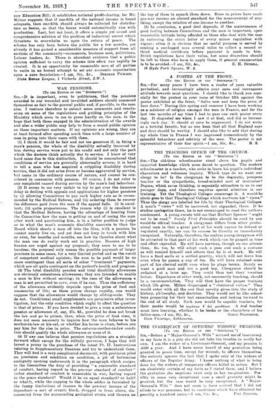WAR PENSIONS.
(To THE EDITOR OF THE " SPEC/MOH:'] SIR,—It is important, even to politician., that the pensions awarded to our wounded and invalided soldiers should commend themselves as fair to the general public and, if possible, to the men also. I venture therefore to submit some comments and conclu- sions on some of the regulations and guiding principles of the Ministry which seem to me to press hardly on the men, in the hope that both those engaged in the administration of the awards and also a wider public may help to form a sound public opinion on these important matters. If my opinions are wrong, they are at least formed after spending much time with a large number of men in going into their cases with them.
(1) I think it would be fair and not too generous if, in fixing a man's pension, the whole of the disability actually incurred by him during service were put to his credit and not only the part which the doctors think actually due to service. I know of very hard cases due to this distinction. It should be remembered that conditions of service are generally abnormally severe; it as hard to tell a man who has acquired a crippling disability during Service, that it did not arise from or become aggravated by service, but came in the ordinary course of nature, and cannot be con- sidered in connexion with pension. Of course, I do not refer to any complaint caused during service by the man's bad behaviour.
(2) It seems to me very unfair to try to get over the immense delay in dealing with appeals and applications for higher pensions by (i) allowing Committees to pay such higher rate as is recom- mended by the Medical Referee, and (ii) ordering them to recover the difference paid from the man if the appeal fails. (i) is excel- lent; (ii) quite preposterous. The reason why (i) is excellent is that the Medical Referee, having the advantage of hearing from the Committee how the man is getting on and of seeing the man after work and questioning him, is in a better position to judge as to what the man's economic disability amounts to than the Board which shoots a man off into the blue, with a pension he cannot nearly live on, and yet does not keep in touch with him or even, for months and months, see how its theories about what the man can do really work out in practice. Reasons of high finance are urged against my proposal; they seem to me to be baseless; the proposal only means the possible payment of larger pensions in some cases, for a very limited period and as the result of competent medical opinion; the sum to be paid would be no more contingent than all sorts of other " treatment " payments, which are all quite contingent on the patient's health and progress.
(3) The total disability pension and total disability allowances are obviously subsistence allowances; they are intended to enable a man to five without earning; in the case of the allowances a man is not permitted to earn, even if he can. Thus the sufficiency of the allowance evidently depends upon the price of food and necessaries of life; as these prices change rapidly, one would suppose that the allowances would change by sliding-scale. They do not. Conditional small supplements are permissive after inves- tigation, but the only condition which ought to affect the question is that of prices. If you have decided to give a man a subsistence pension or allowance of, say, 27s. ed., provided he does not break the law and go to prison, then, when the price of food rises, it does not seem necessary to inquire how the man behaves to his mother-in-law or his cat, or whether his house is clean, before you pay him for the rise in price. The cat-oum-motherein-law condi- tion should qualify the whole allowance or none of it.
(4) If any one believes that pension regulations are a straight- forward affair except for the wilfully perverse, I hope they will invest a penny in the purchase of the latest Pt. II. Instructions relating to Supplementary Pensions and try to understand them. They will find it a very complicated document, with provision piled on provision and condition on condition, a pit of bottomless ambiguity opening underneath it in the paragraph which assigns to the Committee the duty of providing " a reasonable standard of comfort, having regard to the pre-war standard of comfort" (what standard of comfort is reasonable in war, having regard to the peace standard? Would it be an equal standard? or half? or what?), while the capping to the whole edifice is furnished by the funny limitations of income to the pre-war income of the dependant—a sort of erratic block, dropped in from above, die. connected from the surrounding geological strata and thrown on
the top of them to squash them down. Rises in prices have made pre-war income an absurd standard for the measurement of any- thing, except the relation of one income to another.
(5) In conclusion, a good deal depends, if the maintenance of good feeling between Committees and the men is important, upon reasonable latitude being afforded to those who deal with the men in enforcing the strict letter of every minor regulation with rigour; often it is obvious that no useful purpose is served by sending a one-legged man several miles to collect a second or third medical certificate before payment is made to him. Strict regulations have their value, but some disoretion should be left to those who have to apply them, if general exasperation


































 Previous page
Previous page